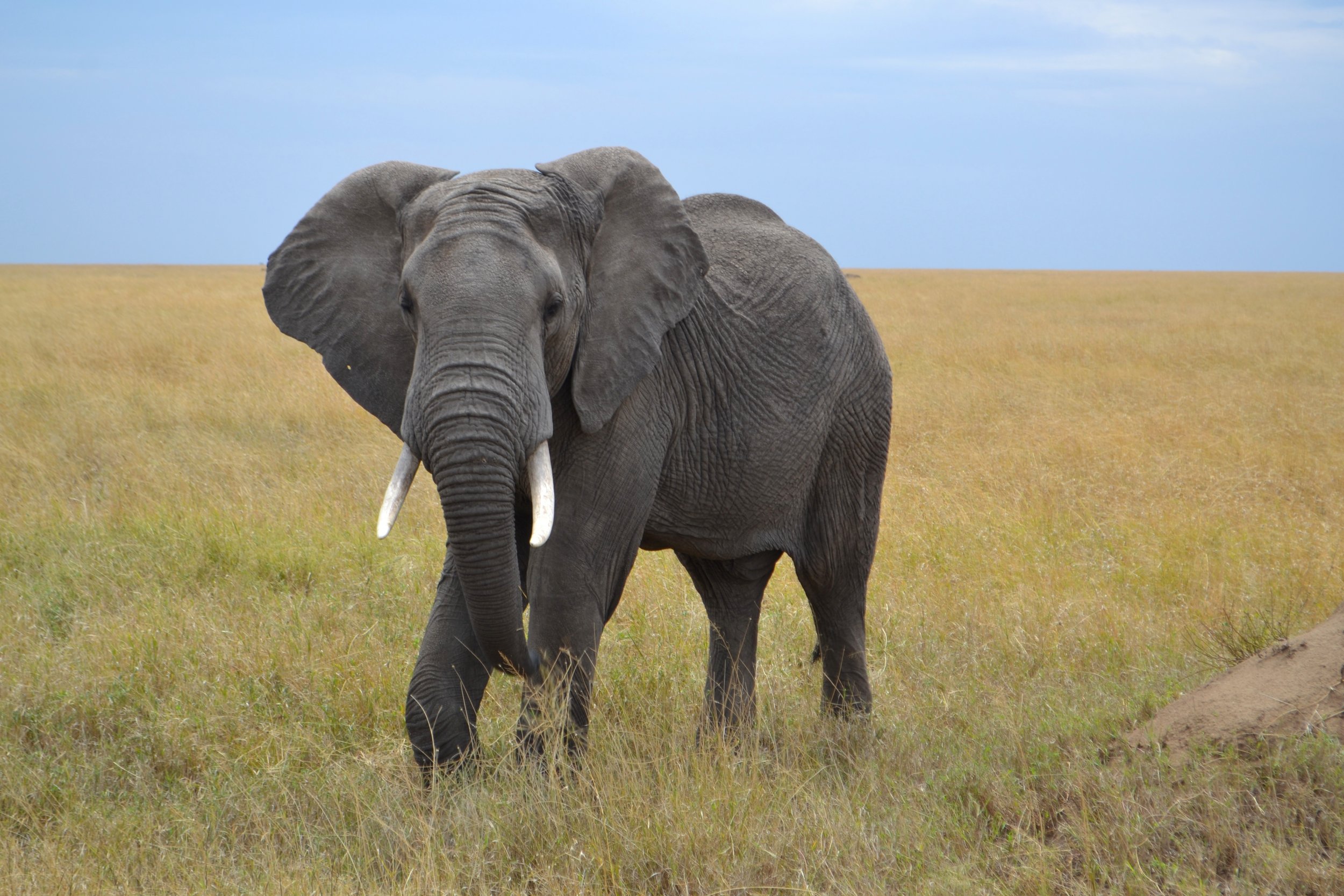
Updated | "If trends continue, Tanzania may not have any elephants left. It's going to be a disaster."
That's how Shruti Suresh, a lawyer with the U.K.-based Environmental Investigation Agency (EIA) explained Tanzania's poaching crisis to me. The EIA released a damning report in November last year, showing that between 2009 and 2014 the elephant population fell from 109,051 to just 43,330. In the southern Ruaha-Rungwa area that was hardest hit, the population went from 34,000 to a mere 8,000. The report concluded that data from ivory seizures worldwide "implicates Tanzania in more large flows of ivory than any other country."
Suresh described the situation as a "toxic blend" of rampant corruption, powerful Chinese crime syndicates and security in the country's southern national parks that was all but non-existent. It transformed the country's elephants into what renowned elephant expert Iain Douglas Hamilton calls "money left lying in the bush."
But now, a new coalition made up of government agencies, conservation groups, activists and foreign governments has launched a renewed assault on poaching. And they're getting results.
I met Wayne Lotter, from the PAMS Foundation, a conservation group working in Tanzania since 2009, at a small restaurant on the outskirts of Arusha, a small dusty city in the country's north that acts as a gateway to the region's national parks. Enthusiastic and charismatic, Lotter explained the situation using a soccer metaphor. Rangers, who protect the national parks, he describes as goalkeepers: While they are key to protecting wildlife, Lotter emphasizes that "they are really the last line of defense."
Lotter argues that instead, greater attention is needed on what he describes as the "defense" and the "offense." The defense, in Lotter's metaphor, are the communities that surround national parks, acting as a buffer zone and providing intelligence on poaching activity. The offense, he says, comes from government agencies working to directly tackle the criminal syndicates that support poaching.
In June this year, Minister for Home Affairs Mathias Meinrad Chikawe announced the creation of the Multi-Agency Task Team (MATT), made up of the Tanzania Forest Services, the Wildlife Division, Fisheries Division, Tanzania Intelligence and Security Services.
According to Adelhelm Meru, permanent secretary for the Ministry for Natural Resources and Tourism, the creation of MATT is part of a national anti-poaching strategy that he has been responsible for coordinating. He explains that MATT will be headed by the inspector general of police and will work with Tanzanian Intelligence to break up crime syndicates.

Key to this renewed anti-poaching strategy has been the country's National and Transnational Serious Crimes Investigation Unit (NTSCIU), which set up a special Task Force to tackle poaching. From January to July 2015, the NTSCIU was responsible for a total of 803 ivory poachers and illegal traders being arrested, with an approximate average of 90 arrests per month. Some 233 of the suspects apprehended have been convicted and fined or sentenced. The sentences given have included seven prison sentences of 20 years and longer. In October, the NTSCIU scored a major success with the arrest of Yang Feng Glan, 66, a Chinese woman dubbed the "Queen of Ivory." Considered one of the most notorious ivory traffickers in East Africa and a key link in the Tanzania-China illegal ivory trade route, she was arrested in Dar-es-Salaam and faces up to 30 years in prison if convicted of trafficking.
Still, there's more work to be done. According to Suresh, from the EIA, major convictions of top-level criminals are far too rare. She also emphasized that major freighting companies, who are often key to transporting ivory out of the country, have escaped with minimal punishment: "We need to see greater progress made arresting and prosecuting people at all levels of the ivory trade to give a clear signal that criminal activity won't be tolerated."
Hampering these efforts is corruption which runs rife in Tanzania—the country ranks 119th out of 175 countries on Transparency International's corruption index. According to the EIA's Vanishing Point report, a secret list containing "names of prominent politicians and businesspeople" implicated in poaching was given to the president in 2012. Shrutesh says not a single government official from the list has been investigated. When I asked Meru from the Natural Resources Ministry about this, he said there was "no evidence" of any government official involved in poaching.
On the ground things are looking more hopeful. Meru explained proudly that the government is recruiting 600 new rangers in 2015 alone. Working with the United Nations Development Fund (UNDP) as well as conservation groups, Meru says they've started using new equipment including vehicles, weaponry and night goggles, and are even considering using drones to track animals and find poachers.
To get an idea of the frontline, I spoke to a park ranger (or "goalkeeper" in keeping with Lotter's metaphor). As we walked through the long yellow grass that covers the vast plains of Serengeti National Park, he described a battlefront where elephant poachers arrive heavily armed and well organized. Often the conflict proves deadly, and not just for the elephants: Gesturing to his AK-47, he said that, in the end, "either he's going to die or I'm going to die."
More effective than Kalashnikovs, however, is education and community outreach, part of the "defense" on the conservation soccer team. Ferdinand Chugu, also from the PAMS foundation, has been working in villages surrounding Tarangire and Lake Manyara national parks, speaking in secondary schools to "impart the importance of wildlife conservation on future generations." Considering that villages often harbor poachers and provide intelligence on animal whereabouts, this kind of outreach has the potential to create long-lasting protection for the country's wildlife.
On a more direct level, some villagers act as what are called "village game scouts," trained to patrol the buffer zones around national parks to report and arrest poachers before they even get to the park. Most of this training, and the allowances scouts receive upon completion, is funded by NGOs and conservation groups.
Commander Venance Tossi is a former police commissioner now in charge of training both park rangers and village game scouts under the Tanzania National Parks Authority (TANAPA). He emphasized the practical nature of teaching in which trainees make arrests during the training itself. Christopher, a game scout who trained with Tossi, told me that during his training, six poachers were caught near Lake Babati and taken into custody.
All this work is creating positive results. Howard Frederick is a conservation biologist who works with both the government and conservation groups to perform aerial surveys of animal populations in Tanzania. He said elephant populations in the Selous region in the south have stabilized, while parks in the north (specifically Tarangire, Serengeti and Lake Manyara) have seen a steady increase. Shortly after I spoke to Frederick, I spent some time in Tarangire National Park: Everyday I saw dozens of elephants, wandering the plains in large family groups, untroubled by the roar of safari jeeps.
Beyond Tanzania, other players are helping too. In July, U.S. President Barack Obama announced a new ban on the ivory trade in the U.S., a move John Calvelli from the Wildlife Conservation Society calls a "huge step in closing one of the largest ivory market in the world." China, where almost all of Tanzania's ivory ends up, has also stepped up its game. In May, authorities announced a plan to phase out its legal ivory market, which acts as a cover for the vast black market trade. However, there has not been a clear indication of when this plan will be implemented. Considering 96 elephants are killed everyday across Africa, any significant delay in the plan could be disastrous.

In May, Chinese authorities destroyed 662 kilos of ivory, while in June, over a tonne of ivory was crushed in New York's Time Square. Tanzania, says Suresh from the EIA, needs to do the same: The government has large stockpiles of seized ivory, some of which has mysteriously gone missing. Meru, from the natural resources ministry, told me the stockpile has now been carefully inventoried, but there are no immediate plans for its destruction.
Ivory sales online are also under renewed scrutiny. In April, a new report from the WCS and the International Fund for Animal Welfare (IFAW) detailed a flourishing black market for ivory on classifieds website Craigslist, sparking a campaign to demand that it block such sales.
Back in Tanzania, poaching has become a political issue. On October 25, Tanzanians will head to the polls. Opposition leader Edward Lowassa of the Chadema Party pledged during the campaign to end the poaching crisis and secure the tourist dollar.
Talk, however, is cheap: More pressing for activists and conservationists is whether Lowassa, who resigned as prime minister in 2008 amid a major graft scandal, can, if elected, stamp out the corruption that has so plagued conservation efforts.
Still, the combined efforts of the global conservation team seem to be paying off, with elephant numbers starting to gain stability. Frederick, the conservation biologist, is heading out this month to conduct a survey of the Ruaha-Rungawa region, which was hardest hit by the poaching crisis. I asked him whether he thought there'd be good news: "I'm hopeful," he said. "I'm very hopeful."
Correction | This story originally spelled the Ruaha-Rungwa national park and the Selous region incorrectly. A quote from John Calvelli has also been corrected to describe Tanzania as one of the largest ivory markets rather than the second largest ivory market in the world.
Uncommon Knowledge
Newsweek is committed to challenging conventional wisdom and finding connections in the search for common ground.
Newsweek is committed to challenging conventional wisdom and finding connections in the search for common ground.
About the writer
To read how Newsweek uses AI as a newsroom tool, Click here.





